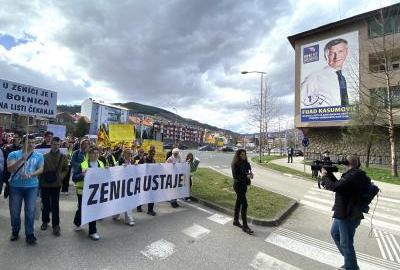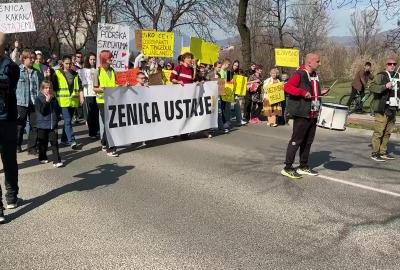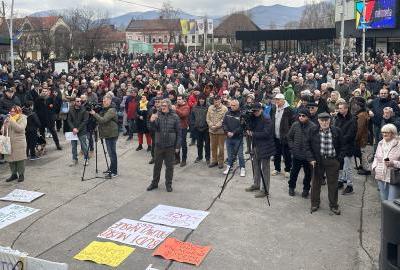Žurnal in English
CONSTRUCTION OF THE HOSPITAL AND MINERS’ SQUARE: The Citizens of Zenica Are Being Deceived by Both the Cantonal Prime Minister and the Mayor
It is possible that the sale of land at Trg Rudara (Miners’ Square) and all other locations with adopted controversial regulatory plans could be annulled through legal proceedings, holding everyone involved in the chain of unlawful decision-making accountable for the abuse of office and compensating investors for damages. However, this is a theory that is largely contradicted by practice.
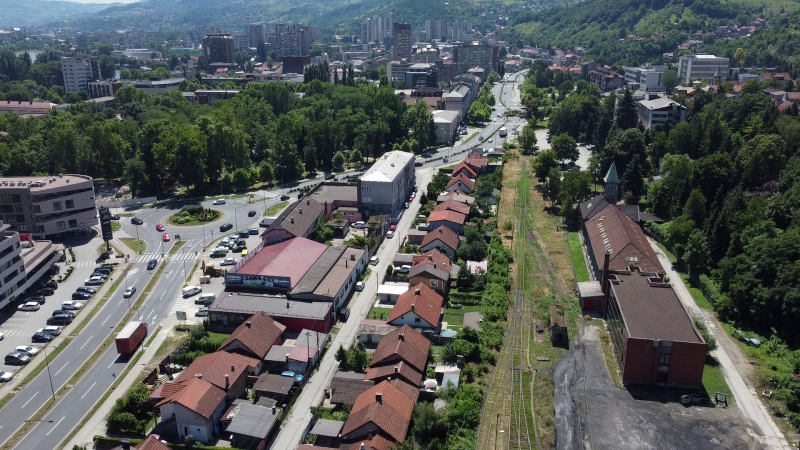
In the fierce competition of tiresome and, above all, useless political squabbles for the citizens, the Zenica-Doboj Canton holds a prominent position. Over the past six months, we have witnessed a true war of statements and press releases, primarily between the ZDC Prime Minister Nezir Pivić and the Mayor of Zenica, Fuad Kasumović.

Fuad Kasumović (right) and Nezir Pivić in a cordial conversation
At first glance, it appears to be a principled fight for respecting the law, but beneath the surface, it is a power struggle aimed at advancing the personal interests of individuals loyal to one side or the other. We will attempt to illustrate, through several examples, how parties and interest groups, as well as certain individuals, operate in the realm of urban planning in Zenica. Meanwhile, the list of contentious locations with legally questionable urban planning and construction permits continues to grow, from Trg Rudara (Miners’ Square) to Zenica-jug (Zenica South) Business Zone.
LAND FOR SALE FOR A HOSPITAL, A BARGAIN PRICE!
The most frequent and heated topic of dispute in recent months has been the construction of a new hospital in Zenica. For the uninformed, the situation is presented as follows: the cantonal government, predominantly SDA-led, wants to build a new hospital within the grounds of the existing one. However, the City of Zenica—specifically its former party-affiliated financial guru, Mayor Kasumović—will not allow it unless the canton purchases the property for a “symbolic” 10 million KM.
“To resolve this issue, the City of Zenica offered the cantonal government a symbolic solution—to purchase the property for 10 million KM, even though the rent for 35,000 m² of business space alone amounts to seven million KM, while the total property value exceeds 150 million KM,” Kasumović told Žurnal.
“We will set a very clear deadline for the City Administration, and if it fails to act, we will not wait for someone to have mercy and grant this land for such a humanitarian project. We will seek a new location and new land to build a new hospital, or rather, a university hospital,” responded cantonal Prime Minister Pivić.
The essence of the matter is this: the City—or rather, the Mayor—cannot sell this property. Both the cantonal government and the City are well aware of this, but the situation suits them both for two reasons. First, it allows them to continue with endlessly useless political bickering that benefits no one but themselves. Second, even if they were to receive immediate approval for the construction, they simply do not have the funds.
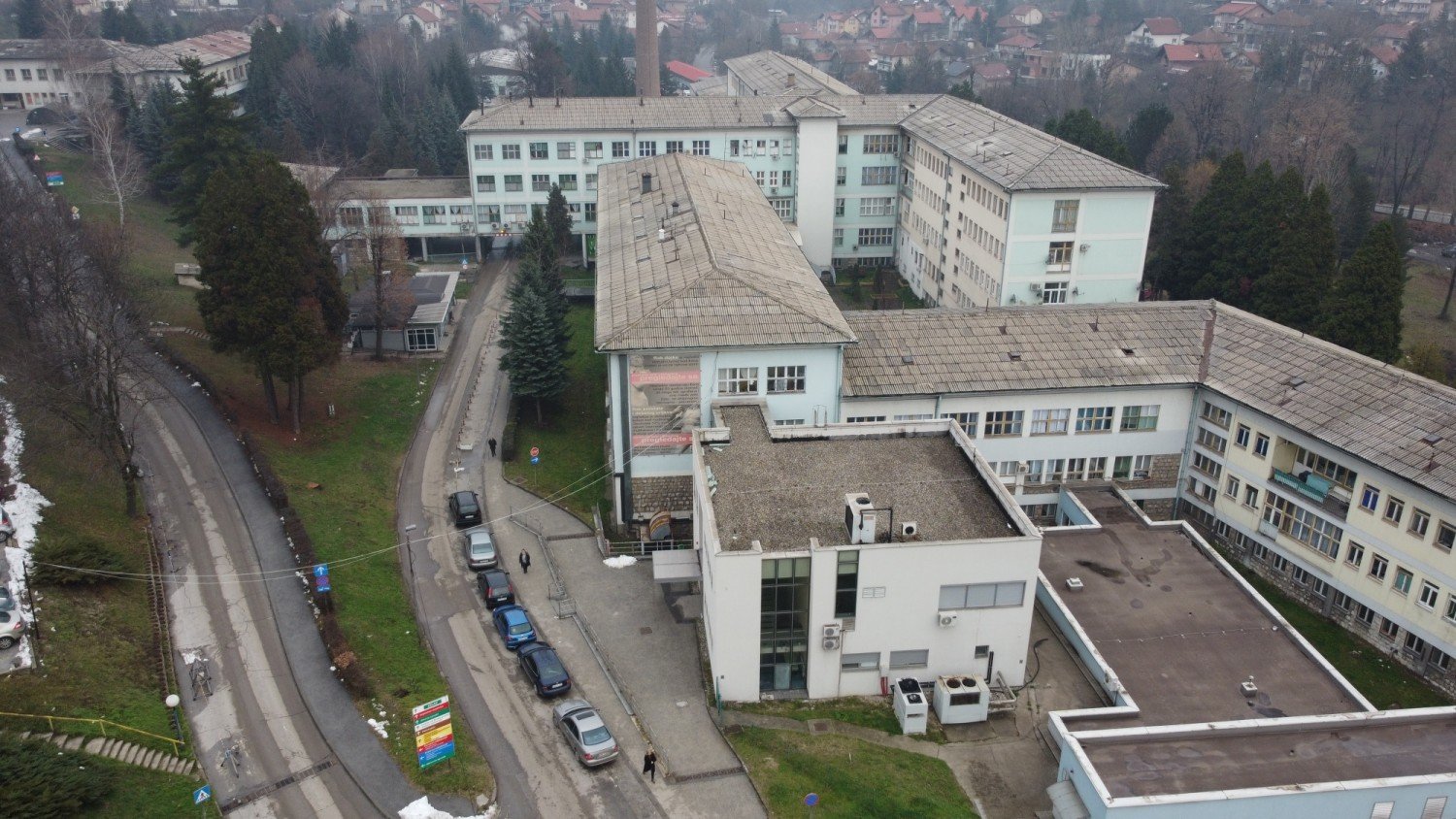
Žurnal reached out to several experts in the field of spatial planning, not only from Zenica and the Zenica-Doboj Canton (ZDC) but also to individuals abroad who are following these developments in their hometown. They were all asked the same questions. To avoid potential manipulation later, their identities will, for now, remain known only to the editorial team. Their answers are nearly identical.
EXPERTS WARN: LAWS EXIST
In reference to the sale of land for the construction of the new Cantonal Hospital, our interviewees highlight that, under the Law on Real Rights of the Federation of Bosnia and Herzegovina (FBiH), public construction land owned by a city/municipality cannot be sold, transferred, or used in a manner that is not in line with the public interest.
They also point out that the City does not have absolute authority to block activities of cantonal significance if a higher level of government (the canton) demonstrates that the land is essential for implementing a project of public interest.
“The Law on Construction Land and the Law on Real Rights of FBiH stipulate that public interest can serve as a basis for transferring the right to use land, even against the will of the local community, provided that the interest is clearly defined and formally proven. The Canton can initiate a procedure to declare the land an area of public interest, which provides grounds for transferring ownership or jurisdiction. Additionally, administrative proceedings or lawsuits can be pursued,” our sources explain.
On the other hand, the City—or rather, the Mayor—did not hesitate to grant construction rights to a private healthcare facility within the grounds of the Zenica hospital. Three months ago, a cornerstone-laying ceremony was held for the Heart Clinic. Kasumović justified this decision by claiming they "could no longer wait for higher levels of government to start such a project."
Our interviewees also have several criticisms of this project. They argue that by selling the land to a private clinic, the City undermines public interest if that land has strategic importance for the expansion of the Cantonal Hospital. Simultaneously, the construction of a private clinic must follow the standard procedure for obtaining urban planning and construction permits, which are issued by the City of Zenica.
“If the City approved construction on state-owned land without the consent of higher levels of government, this could be grounds for annulment of the permit. If the City had the Canton's consent, then the hospital doesn’t require expansion space, or there are other interests at play,” they conclude.
THE MYSTERY OF LAND RENT
In addition to demanding 10 million KM as a condition for allowing the canton to build a new hospital, the Mayor of Zenica raised the issue of land rent.
“Rent (fees for land use or development) cannot be used as a basis for selling land to a higher level of government. Rent is usually intended for infrastructure development or space improvement, not for transactions between public entities,” point out experts consulted by Žurnal, highlighting yet another inconsistency.
Rent should be allocated for the construction and maintenance of public infrastructure (roads, water supply, sewage systems), the improvement of public spaces (parks, squares, playgrounds), and the enhancement of communal services. In Zenica, there is no dedicated Fund for Land Development or Urban Development Fund, meaning rent revenues end up in the City’s general budget. This lack of transparency makes it difficult to track how the funds are spent.
“Private investors often exert significant influence over local government decisions. They may lobby for solutions that reduce their costs (e.g., avoiding obligations to invest in infrastructure). Unfortunately, a lack of transparency in managing public revenues, including rent, is a common problem in many cities. If rent revenues are not explicitly allocated to infrastructure projects or improving citizens’ quality of life, it creates opportunities for corruption and favouritism towards powerful individuals,” warn the experts.
From what has been stated, it appears that both the City and the Canton, or more precisely their leaders, manipulate data and selectively apply laws in ways that primarily benefit their political agendas and, potentially, other interests. Behind their public disputes, they secretly find common ground in dividing areas of interest, particularly in urban “ventures” and public procurement projects funded by the budget.
Ultimately, when it comes to spatial planning and construction, it raises the logical question of who and what the government, ministry, cantonal urban planning institute, cantonal and city legal departments, municipal services, inspection bodies, and the Prosecutor’s Office of ZDC serve. These entities can and must respond to the unlawful activities described.
HOW THE PROSECUTOR'S OFFICE THE LAWLESSNESS OF CONSTRUCTION CARTELS IN ZENICA
Bosnian and Herzegovinian politicians should not be forgiven under the excuse that they don’t know what they are doing. They are well aware when they break the law, but in their arrogance, they believe they are above or outside all regulations. This was clearly demonstrated by the Prime Minister of the Zenica-Doboj Canton, Nezir Pivić (SDA), who stated that he would pay 10 million KM for the land and buildings within the Zenica hospital, as requested by the Mayor of Zenica, Fuad Kasumović.
“Every day we lose is too much for all of us. For this reason, I hope that there will be no new conditions now and that we can proceed with the implementation of such an agreement, where the Canton will commit to realising certain projects in the City of Zenica, in exchange for fully handing over ownership of KBZ,” Pivić said.
Of course, this statement should not be taken as a done deal. Tomorrow, the situation could completely change, and who will remember what was said just a few days ago…
THE LEGALLY “UNSKILLED” PRIME MINISTER
As a reminder, Žurnal presented expert opinions from the fields of law and urbanism in the first part of this article regarding the saga of constructing the new Zenica hospital and the potential sale of land claimed by Mayor Kasumović.
“According to the Law on Real Rights of FBiH, public construction land owned by a city/municipality cannot be sold, transferred, or used in a way that is not in accordance with the public interest. The Canton can initiate a procedure to declare the land an area of public interest, which provides grounds for transferring ownership or jurisdiction,” experts were clear in their interpretation.
Let’s consider the likelihood that Prime Minister Pivić, as a Doctor of Law, might know or easily verify legal provisions. However, it is clear that there is a belief that, if such a land sale were to take place, the Prosecutor’s Office of Zenica-Doboj Canton would not concern itself with these details. After all, it’s not like Pivić signed his book for the Chief Prosecutor Vesna Kaknjo, who eagerly attended his book launch.
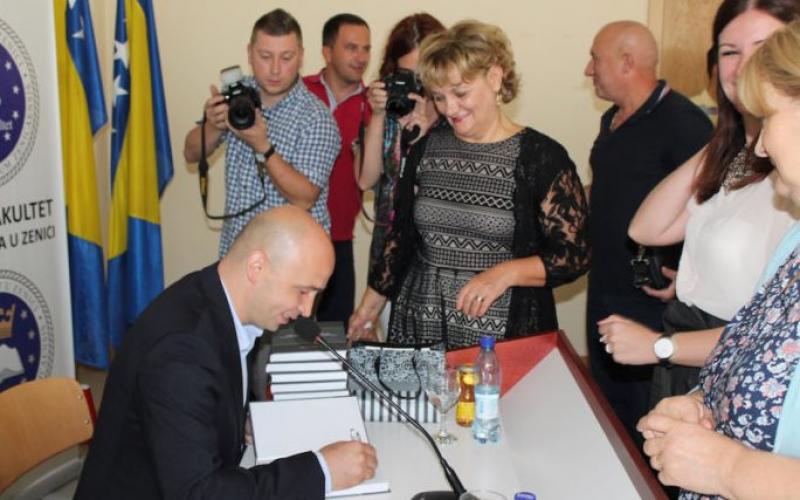
photo: direktno.ba
He knows that the Prosecutor’s Office won’t be curious about the spent millions, unlike the Government of Switzerland, which forced him to return several hundred KM he spent on hotel accommodation for his then-girlfriend during a “working trip” to Tučepi.
Let’s reiterate the points made by our sources through two key statements:
- The City or Municipality cannot directly sell municipal construction land to a higher level of government (the Canton) in exchange for rent, especially if the land is of cantonal significance, as there are strictly regulated legal frameworks and competencies that must be adhered to.
- If the land is of cantonal significance, the decision on its use, disposal, or sale is made by the Canton in accordance with the appropriate laws.
In translation, there is no need for the Canton to allocate ten million KM, no matter how much the former SDA expert for "budget manipulation" might demand. If there are certain “deals” behind the scenes, sooner or later, the truth will become clear.
IT WAS ONCE TRG RUDARA
When mentioning possible "deals," one cannot exclude the situation with Trg Rudara in Zenica, a location whose sale and the legality of issuing a construction permit have been "under investigation" by the Zenica Prosecutor's Office for over three years. Given their pace, the investigation will likely conclude when residential-commercial buildings emerge there in a few years.
A reminder for those who may have forgotten – in September 2018, the City of Zenica’s Planning Council did not adopt several regulatory plans. Three members of the Council, Boris Britvar, Semir Spahić, and Vedad Šestić, opposed the unlawful actions because there was no valid Spatial and Urban Planning document as a prerequisite for drafting the Regulatory Plans. Kasumović then removed these three from the Council and replaced them with loyal cadres. The Council quickly adopted regulatory plans for the Zenica-sjever (Zenica-North) Business Zone and the settlements in the central city area, including Odmut, Jalija, Talića Hill, and Trg Rudara.
The Zenica City Council adopted these changes without the necessary prior approval from the Ministry for Spatial Planning, Transport, and Communications of ZDC. Did the members of the City Council have personal or political interests in making this decision? Could there be suspicions of corruption or unlawful agreements between private investors and local authorities? There are many questions. Everything is problematic if, as in this case, the sale and the change of the planning document coincide without following legal procedures.
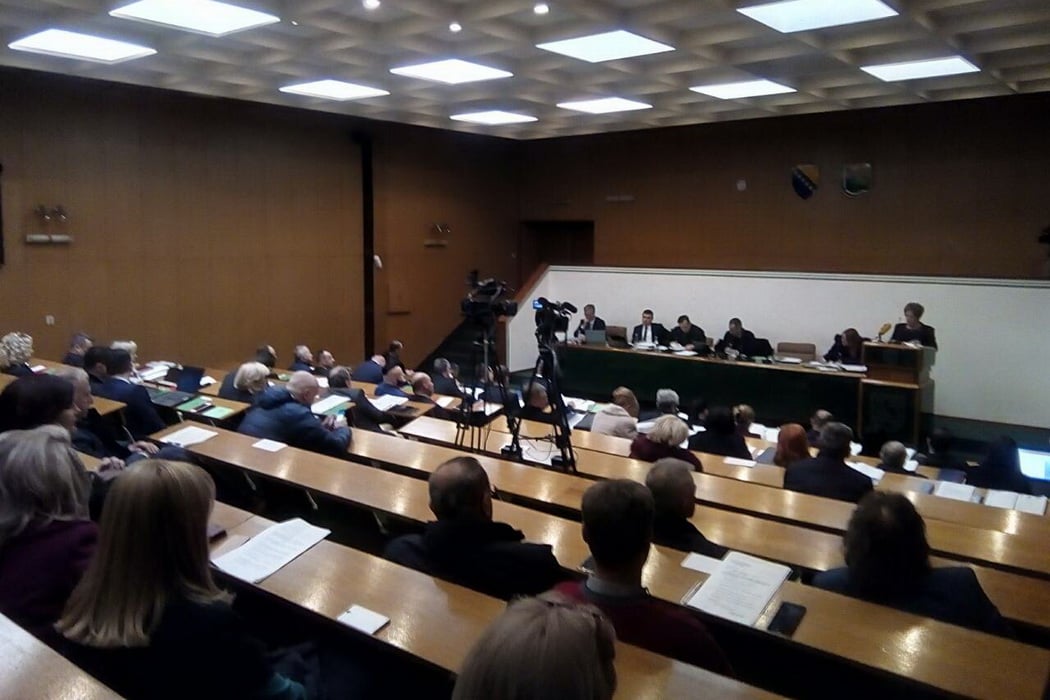
For an unknown price, the company "Euro-mont" Zenica purchased the 6,500 m² of land. In the meantime, the trees in the square have been cut down, and excavation work has begun. Excavation is proceeding much faster than the investigation by the Prosecutor's Office or the response from the Government of ZDC and its inspection bodies.
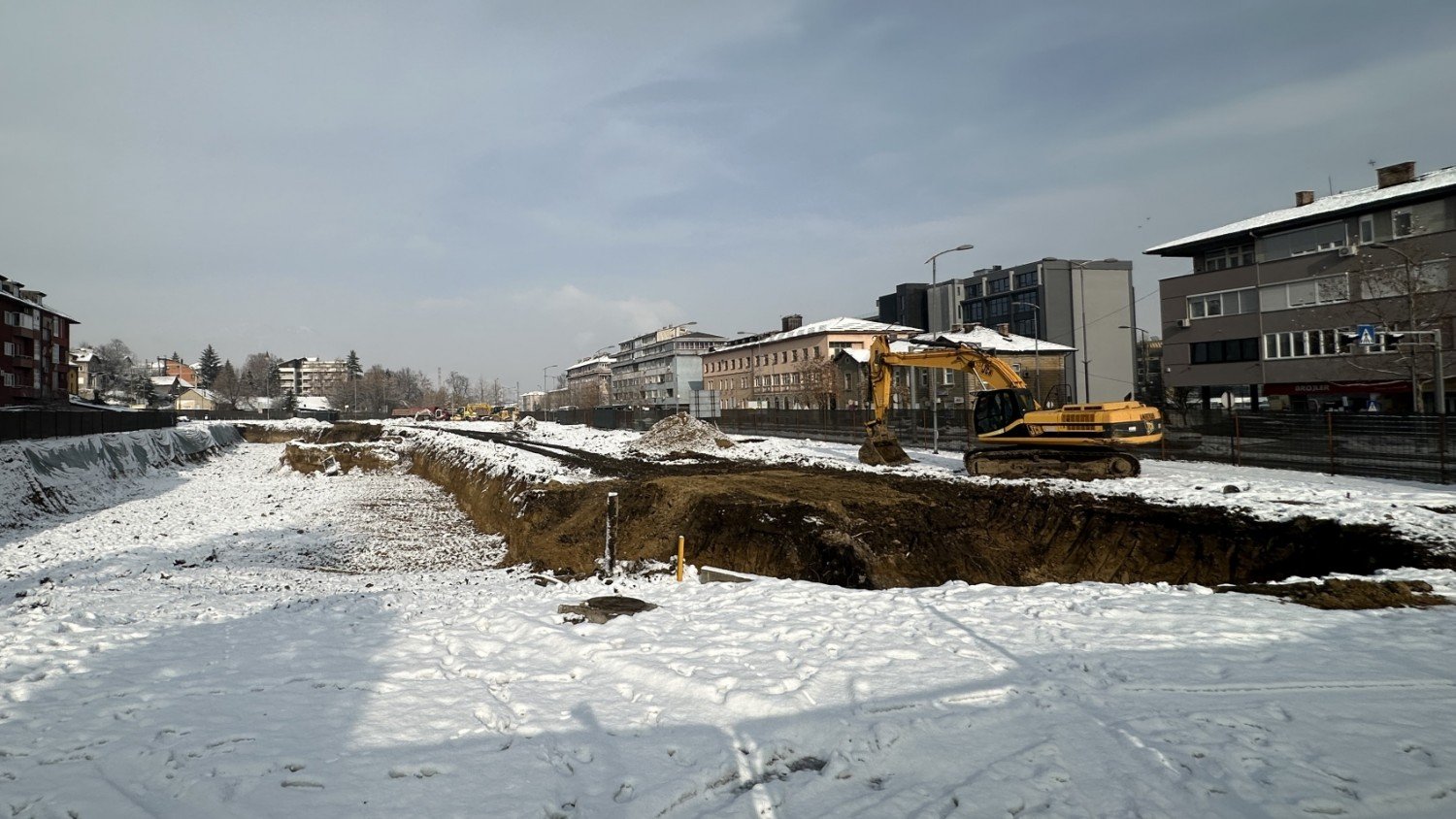
Miners' Square 5.1.2025. (Photo: zurnal.info)
One of those who publicly and consistently points out the assault of construction lobbies on the area of Zenica, which are favoured at any cost while disregarding all regulations, is architect Boris Britvar, a former federal minister of spatial planning who is well-versed in this field.
"All the facts about the urban destruction of Zenica by the city administration, the city council, and the construction lobby are known, and so is the ZDC Prosecutor's Office. Those who think and say that the Government of ZDC can't do anything to save the city are wrong. The Government of ZDC, in legal terms, has absolutely all the authority to annul the illegal documents and building permits issued by the city administration, but they simply don't want to do it, even though Article 22 of the Law on Spatial Planning and Construction, which the ZDC Government passed at the beginning of its mandate in December 2023, mandates a fight against illegal activities and corruption in the field of urban planning and construction," Britvar explains.
Hypothetically, what if tomorrow Mayor Kasumović gives up his demand that the canton pays ten million for the construction of the new hospital, and the Canton suddenly confirms the legality of the disputed Zenica urban planning documents? Of course, before that, they would have to find a "victim" who would knowingly sign the illegal decisions. This might temporarily "smooth things over" in their mutual relations, while the prosecutor’s office could happily archive the investigation based on a complaint once filed by a group of citizens organized in the “Movement for a Change.”
We also asked our interlocutors from the first part of the text about the “Trg Rudara” case.
"There was no legal procedure. The purpose of the land at the Trg Rudara location, according to the Urban Plan from 1983, when it was adopted, was a green area. If it is a legal obligation to follow a higher-level plan, then it was legally impossible to plan anything for construction on that land. When you have a clear higher-level planning document, which the Cantonal Institute for Urbanism and Spatial Planning of Zeničko-Dobojski Canton has, which worked on the Spatial Plan of the City of Zenica and the Spatial Plan of ZDC, then it is clear that regarding the non-compliance with land use, no one could give a positive opinion, because it would be against the law," was their clear conclusion.
A previous attempt to discuss this issue with Mayor Kasumović was futile.
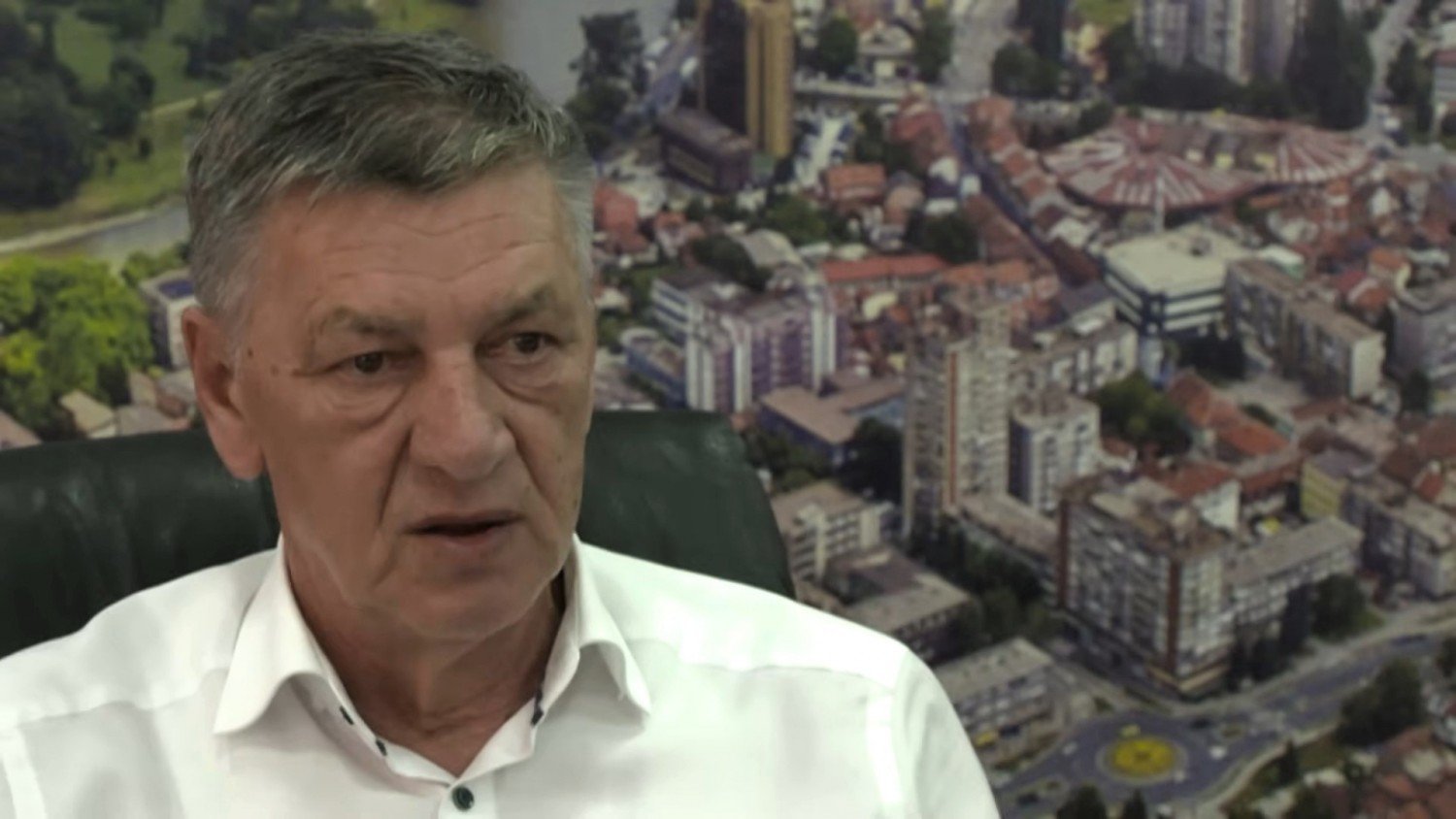
Fuad Kasumović (zurnal.info)
It is possible that the sale of land at Trg Rudara and other locations with disputed urban plans may be annulled through legal means, and that all those involved in the illegal decision-making process could be held accountable for abuse of power and damages to investors. However, this is still a theory that is widely contradicted by practice.
Žurnal wrote long ago that the real test for the Mayor of Zenica to prove that he is not acting for personal gain would be his role in preparing the city's Spatial Plan. Following events, Kasumović has shown that Žurnal's doubts were justified and that he is a consistent successor of the SDA and their former style of governing Zenica and ZDC.
(zurnal.info)






